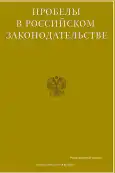Grounds and Conditions for Conducting a Short-Form Inquest
- Authors: Lychev M.V.1
-
Affiliations:
- Moscow State Pedagogical University
- Issue: Vol 15, No 5 (2022)
- Pages: 444-448
- Section: Articles
- URL: https://journal-vniispk.ru/2072-3164/article/view/147700
- ID: 147700
Cite item
Abstract
Full Text
##article.viewOnOriginalSite##About the authors
Mikhail Vasilievich Lychev
Moscow State Pedagogical University
Email: lyhevfemida@mail.ru
Postgraduate student of Socio-Humanitarian Education Institute Moscow, Russia
References
- Aleksandrov S.A. Abbreviated inquiry: novels of the Code of Criminal Procedure of the Russian Federation and the complexity of their application / S.A. Aleksandrov, M.V. Lapatnikov // Criminal trial. 2013. No. 4.
- Gerasenkov V.M. Topical issues of the production of inquiry in an abbreviated form. // Bulletin of the Bryansk State University. 2015. No. 1.
- Golovko L.V. Course of criminal procedure. M., 2017.
- Grigoriev D.A. Accelerated form of pre-trial proceedings in a criminal case and human rights // Justice of the peace. 2011. No. 6.
- Davletov A.A. Criminal Justice of the Russian Federation: a course of lectures. 5th ed., revised. and additional Yekaterinburg: IRA UTK, 2017.
- Zhuravleva N.M. Inquiry in an abbreviated form in the Russian criminal process: problems of legislative regulation, theory and law enforcement. Yekaterinburg 2020.
- Kolosovich M.S., Kolosovich O.S., Mitkova Yu.S. Registration of materials of a criminal case during the production of an inquiry in an abbreviated form: a textbook. - Volgograd: Vesti-Plus, 2014.
- Muraviev K.V. Inquiry in an abbreviated form: commentary on chapter 32.1 of the Criminal Procedure Code of the Russian Federation // Legislation and practice. 2013. No. 1
- Perekrestov V.N. Admission of guilt as a condition for an abbreviated procedure of inquiry // Inquiry in an abbreviated form: issues of legislative regulation and problems of law enforcement: Sat. Art. / under total ed. I.S. Dikareva. Volgograd, 2013.
- Sadykov A.U. Problems of legal regulation of inquiry in an abbreviated form // Society and Law. 2015. No. 4 (54).
- Yushkov S.V. Socio-political system and law of the Kyiv state. M., 1949.
- Monthly collection of the General Prosecutor's Office of the Russian Federation The state of crime in Russia for 2014, 2015, 2016, 2017, 2018, 2019, 2020, 2021.
Supplementary files








